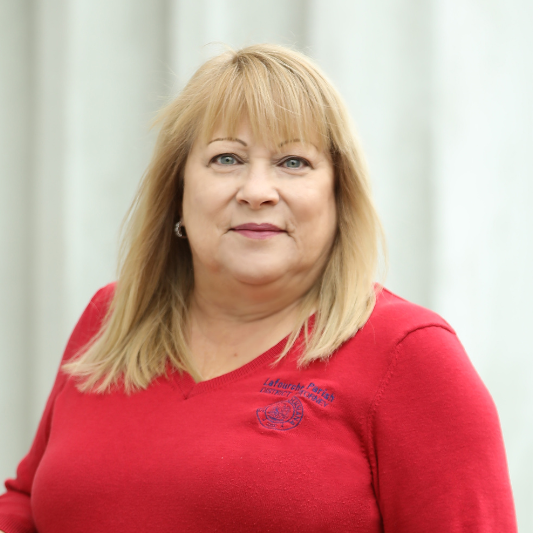
Victims’ Assistance
The Victims’ Assistance Department of the Lafourche Parish District Attorney’s Office is designed to aid victims and their family members as they move through the criminal justice system. In furtherance of this effort, the department will provide advocacy, notification, support, and education. The department will work to ensure that all victims of crime are treated with dignity, sensitivity, and respect.
The Victims’ Assistance Department is committed to:
- Ensuring the full implementation of victims’ rights
- Providing a secure, supportive environment where victims have complete access to notification, support, advocacy, and education
- Providing support to victims without regard to age, race, gender, ethnicity, religion, sexual orientation, or socioeconomic status.
This department is an integral part of the District Attorney’s Office. It is our mission to work closely with victims to ensure effective and efficient prosecution of criminals.
Our District Attorney, Kristine Russell, has incorporated a Licensed Clinical Social Worker into the Victims’ Assistance Department to provide emotional support services to aid in the healing and rehabilitation process.
Russell noted that many victims do not seek out counseling because of limited time or a lack of resources, so she felt her office had an obligation to provide that service. While victims of sexual assault, domestic abuse battery, and other violent offenses will be the primary focus of the Victims’ Assistance Department, other victims who could benefit would be welcome to utilize the services as well.
LPDA –
Victims’ Assistance Department
(985) 447-2003
(Ask for the Victims’ Assistance Department)
Victims’ Assistance Team

Heidi Irwin
Licensed Clinical Social Worker
Geralyn Pitre
Victims’ Assistance Coordinator
Shelby Mike
Victims' Assistant
Elizabeth Leblanc
Victims' AssistantServices We Provide
Advocacy
The Victims’ Assistance Coordinator and the Licensed Clinical Social Worker will be available both inside and outside of the courtroom to answer questions and provide information about court proceedings.
Notification
The Assistant Victims’ Coordinator will keep the victim notified throughout the judicial process through written and verbal communication. The information will include details about upcoming court dates. Phone contact as well as face-to-face contact may be made throughout this process.
Education
This department is committed to educating the community on the judicial process, insightful tips, and other helpful information. For example, letters that are sent by mail to victims include definitions of specific court proceedings to increase knowledge and awareness.
Support
Victims will have access to receive support services from the Victims’ Assistance Coordinator, as well as the Licensed Clinical Social Worker.
The Victims’ Assistance Department acknowledges that the level of support may vary for each victim. The primary objective of this department is to provide brief assessment to determine if the victim could benefit from an additional layer of support.
The Victims’ Assistance Coordinator is available to provide support via phone or face-to-face contact, accompany the victim to court proceedings, and provide community based referrals.
The Licensed Clinical Social Worker is available to provide crisis intervention, victim stabilization, accompany victims to court proceedings, and coordinate community based referrals.
Domestic Violence
Who are domestic violence victims?
Domestic violence knows no race, gender, sexual orientation, age, religion, marital status, or education level. It can happen to ANYONE.
Why do some victims stay?
Victims may stay in the relationship due to fear, danger, embarrassment, cultural reasons, etc. It is important to sympathize with victims and provide support.
Why do people abuse?
The perpetrator is usually motivated by the need to exert intimidation, control, or power. He/She may use abusive tactics to implement their abuse.
Although drugs and alcohol can influence the intensity of abuse, it is vital to understand that these factors are not the cause.
A Message to Victims
You are not alone in this journey. You have a department willing to provide information as well as support during this time. The strength you possess is far more powerful than you can imagine.
Let us help you and put an end to domestic violence and criminal activity. Together we can make it happen.
You are not a victim. You are a survivor.
“No matter why it happens, abuse is not okay and it’s never justified.”


Kristine Russell
District AttorneyResources
The Haven
The P.A.C.T. Place
Domestic Violence Crisis Line:
Children’s Advocacy Center:
Sexual Assault Crisis Line:
Victims have the right to:
- Be treated with dignity, respect and sensitivity
- Receive reasonable notice and have the option to be present and heard during all critical stages of pre-conviction and post-conviction proceedings.
- Be allowed access to private and secure meeting areas during court proceedings
- Be allowed to consult with the prosecution prior to the trial and final disposition of the case
- Have the option to refuse to be interviewed by the accused or a representative of the accused
- Be allowed to seek restitution, if eligible
- Be provided assistance to complete a written or oral impact statement
- Be informed upon the release from custody or the escape of the accused
- Be provided with a reasonably prompt conclusion to the case
- Be treated with dignity, respect and sensitivity
- Receive reasonable notice and have the option to be present and heard during all critical stages of pre-conviction and post-conviction proceedings.
- Be allowed access to private and secure meeting areas during court proceedings
- Be allowed to consult with the prosecution prior to the trial and final disposition of the case
- Have the option to refuse to be interviewed by the accused or a representative of the accused
- Be allowed to seek restitution, if eligible
- Be provided assistance to complete a written or oral impact statement
- Be informed upon the release from custody or the escape of the accused
- Be provided with a reasonably prompt conclusion to the case
